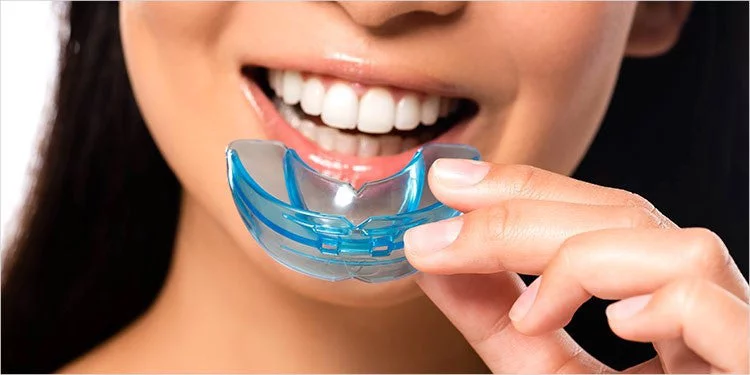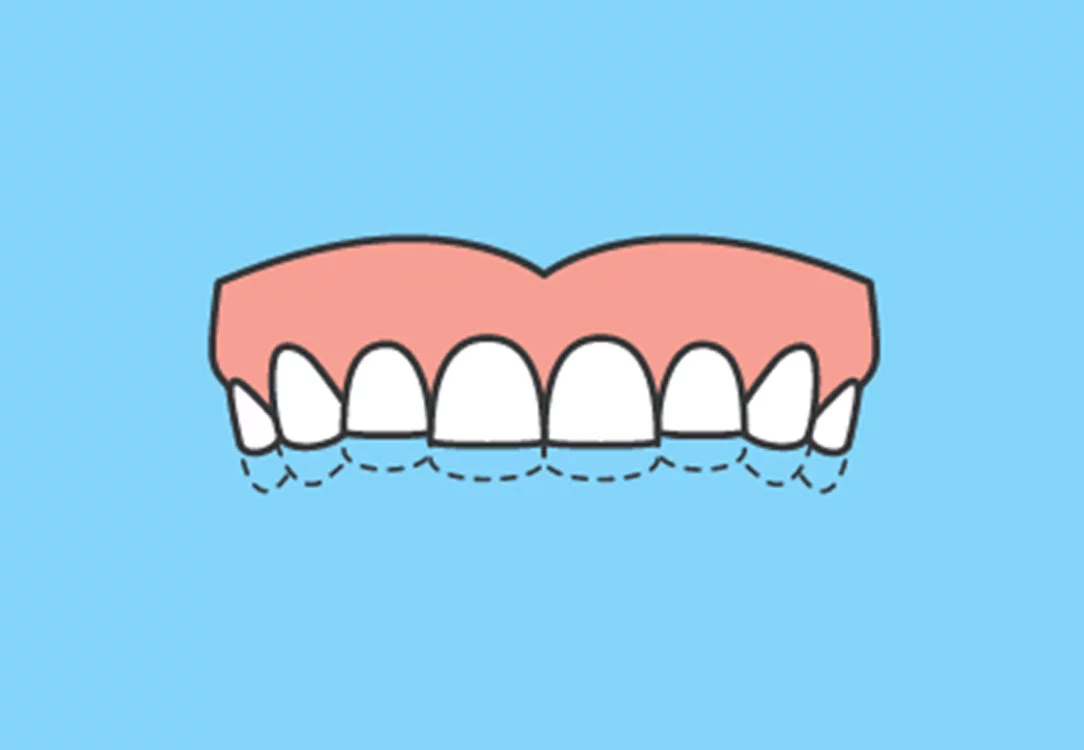If you’ve ever shared a bed or even a room with someone who grinds their teeth at night, you know the distinct sound – it can almost feel like you just heard nails scratch down a chalkboard. It’s hard not to hear and even harder to sleep through the relentless grinding—but what if you are the person grinding your teeth? Bruxism is a condition that can affect your sleep, your oral health, and your overall mental and physical health.
Bruxism is a condition, often referred to as “teeth grinding,” that can involve both jaw clenching and grinding or gnashing the teeth. Although it is usually thought to occur primarily at night (sleep bruxism), it can also happen during the day (awake bruxism). Whether asleep or awake, grinding and clenching teeth can cause significant problems for the teeth and jaw.
Bruxism primarily affects children, adolescents, and younger adults in a higher percentage, as people tend to grow out of the condition by middle-age and older adulthood.
Why Do People Grind Their Teeth?
Bruxism can cause damage to the teeth and pain in the temporomandibular joint, which is the place where your skull and jawbone connect. But what causes teeth grinding? Grinding teeth in sleep can be caused by several things.
Anxiety and stress run rampant these days, leading to a plethora of negative effects on our overall and even oral health. Stress during the day can result in awake bruxism during tense situations or sleep bruxism during fitful sleep.
Habit and Coping Mechanisms
We all have things that help us get through the day—some people use teeth grinding and jaw clenching as a coping mechanism (possibly without even knowing they’re doing it!) and may also clench in the midst of deep concentration.
Research shows that there may be a genetic component to bruxism; there’s a strong possibility that if you suffer from bruxism, someone else in your close family does too.
Many external factors could cause teeth grinding, including caffeine, medications, recreational drug use, and alcohol consumption.
Physical and Mental Disorders
Sleep disorders such as sleep apnea, mental disorders like ADHD, and other disorders such as Prader-Willi Syndrome can all lead to bruxism.
Teeth Grinding in Sleep: How Do I Know?
It can be hard to know if you grind your teeth in sleep, as it is pretty difficult to diagnose yourself when you’re fast asleep! If you share a bed with someone, they will likely let you know if you grind your teeth at night. It’s not a pleasant sound and can easily wake others up.
How is Sleep Bruxism Diagnosed?
Your dentist may discover teeth grinding symptoms during the course of a regular exam, as it can have a
significant effect on your teeth, jaw, cheeks, and bone structure. Bruxism symptoms can include worn-down teeth, headaches, damage to the cheeks from biting, and pain in the jaw or ears.
Another way to diagnose sleep bruxism is with
polysomnography, which is an overnight
sleep study. While a sleep study can be expensive and inconveniently lengthy, it may be worthwhile if there are other sleeping conditions surrounding the bruxism that would be important to diagnose.
What Does Grinding Your Teeth in Your Sleep Mean?
Grinding your teeth in your sleep indicates that a disturbance to your sleep pattern is causing the repetitive chewing, gnashing, or jaw clenching associated with bruxism. If you don’t have any known disorders or genetic conditions, teeth grinding can mean it’s time to step back and analyze your lifestyle. Are you overly stressed? Drinking too much caffeine or alcohol before bed? Using drugs recreationally? Taking medications that may indicate bruxism as a side effect? A proper self-analysis can be extremely beneficial when addressing lifestyle factors that could cause teeth grinding in your sleep.
Is Grinding Teeth at Night Normal?
It’s important to point out the difference between something being common and being normal – just because something is common doesn’t mean it’s normal. Bruxism is not normal but is a fairly common condition amongst children, teens, and younger adults. The statistical range is wide, with
5.9% to 49.6% of children grinding their teeth. Some studies have shown that about
17% of adolescents have bruxism, and the percentages are even less for middle-aged and older adults.
How Can I Tell if My Child Grinds Their Teeth?
If you believe your child might be included with those who grind their teeth at night, there are a couple of ways to know for sure. It goes without saying that the first would be to listen! You certainly can’t hear something like jaw clenching, so if that’s their main habit, then you won’t hear much. But if they are prone to actually grind or gnash their teeth using a chewing motion that creates contact between the teeth, you’ll likely be able to hear it if you’re in the same room (and if it’s really bad, you could possibly even hear it from the next room!).
However, the best way to know your child grinds their teeth is with a visit to their dentist. The dentist will perform a complete exam to determine if bruxism symptoms are present, such as a wearing down of the teeth, chips, cracks, or tenderness around the temporomandibular joint. Your child’s dentist will know if bruxism treatment, such as a mouth guard for teeth grinding, will be necessary and has the knowledge, experience, and skills to guide you forward on the best path for your little one.
Why Is Teeth Grinding Harmful?
It’s important to learn how to relax your jaw and how to stop clenching teeth, as teeth grinding can be quite harmful. Bruxism can cause damage to the teeth themselves by wearing them down, which gradually changes the surface structure of the teeth and can affect your bite. The pressure can also loosen, chip, or crack teeth if left unchecked. Over time, consistently grinding your teeth can wear away the protective outer layers of the enamel, revealing the more sensitive lower layers of the teeth and creating a whole new set of oral health issues.
Bruxism can lead to headaches, earaches, and paint at the joint, especially if you don’t recondition yourself and learn how to stop clenching jaw muscles whether you’re awake or asleep. Continuous issues with jaw clenching can lead to jaw disorders and other long-term challenges.
Teeth grinding can disrupt your sleep, preventing you from getting the deep sleep your body desperately needs. This can be very harmful, especially if your bruxism stems from stress and/or anxiety – it’s important to get plenty of rest during periods of high stress and anxiety, or you may be prone to use other coping mechanisms to deal with the exhaustion, and so a cycle begins. Stress and anxiety lead to bruxism. Bruxism robs you of quality sleep, which can cause exhaustion during the day, leading to increased caffeine use, which leads to even worse sleep. The effects of teeth grinding truly can reach far beyond your oral health.
How to Stop Grinding Teeth?
Though the initial response to grinding teeth may be a teeth-grinding guard, there are actually a variety of approaches you can take to resolve this issue.
Reduce Stress and Anxiety
Stress and anxiety have extremely detrimental effects on the body, even beyond bruxism. Find healthy ways to cope that align with your everyday lifestyle. Get some exercise, spend a bit of time in the sun, find a hobby that you enjoy, practice deep breathing exercises—and the list goes on! Discover what works for you and take at least one step a day towards reducing your overall stress and anxiety levels.
Reduce Consumption of Caffeine, Tobacco, and Alcohol
According to a 2016 study by the American Dental Association, those who smoke and drink alcohol are about twice as likely to experience bruxism. Tobacco, alcohol, and caffeine can have a negative effect on your sleep cycle. It may increase the likelihood of suffering from bruxism – so trade that soda or nightcap for a nice, decaffeinated tea before bed, which may help you relax and not fall asleep with tense jaw muscles.
Use a Night Guard for Teeth
Your dentist can help you find a mouth guard for sleeping that will work for your unique situation. A night guard is a great option for reducing the surface and structural damage to teeth, as it keeps them from rubbing together during episodes of teeth grinding.
If your bruxism stems from a disorder or underlying condition, see your general practitioner for treatment options. There may be a medication they can prescribe that will relieve or even resolve the issue, possibly putting a stop to the teeth grinding.
Find a Dentist Near You to Treat Bruxism
If you’re struggling with bruxism, you aren’t alone. It can cause significant disruption to your sleep, oral health, and everyday quality of life. While there are certainly many options you can try on your own to stop grinding your teeth, you may still suffer from damage done to your teeth and jaw over time. If you're asking where to find a dentist near me, the Smile Generation’s Find a Dentist tool makes it easy to find a dental professional in your area – reach out to a dentist today that can come alongside you on the journey to restful sleep and a future free of bruxism.
Find your trusted, local dentist today!
- https://www.mayoclinic.org/diseases-conditions/tmj/symptoms-causes/syc-20350941
- https://www.nhs.uk/conditions/teeth-grinding/
- https://pubmed.ncbi.nlm.nih.gov/30092895/
- https://pubmed.ncbi.nlm.nih.gov/25628080/
- https://www.sleepfoundation.org/bruxism
- https://www.mayoclinic.org/diseases-conditions/bruxism/diagnosis-treatment/drc-20356100
- https://www.mayoclinic.org/diseases-conditions/bruxism/symptoms-causes/syc-20356095
- https://www.sleepfoundation.org/bruxism
- https://www.mouthhealthy.org/en/az-topics/t/teeth-grinding
- https://www.aaoinfo.org/blog/why-do-straight-teeth-matter/
Smile Generation blog articles are reviewed by a licensed dental professional before publishing. However, we present this information for educational purposes only with the intent to promote readers’ understanding of oral health and oral healthcare treatment options and technology. We do not intend for our blog content to substitute for professional dental care and clinical advice, diagnosis, or treatment planning provided by a licensed dental professional. Smile Generation always recommends seeking the advice of a dentist, physician, or other licensed healthcare professional for a dental or medical condition or treatment.









